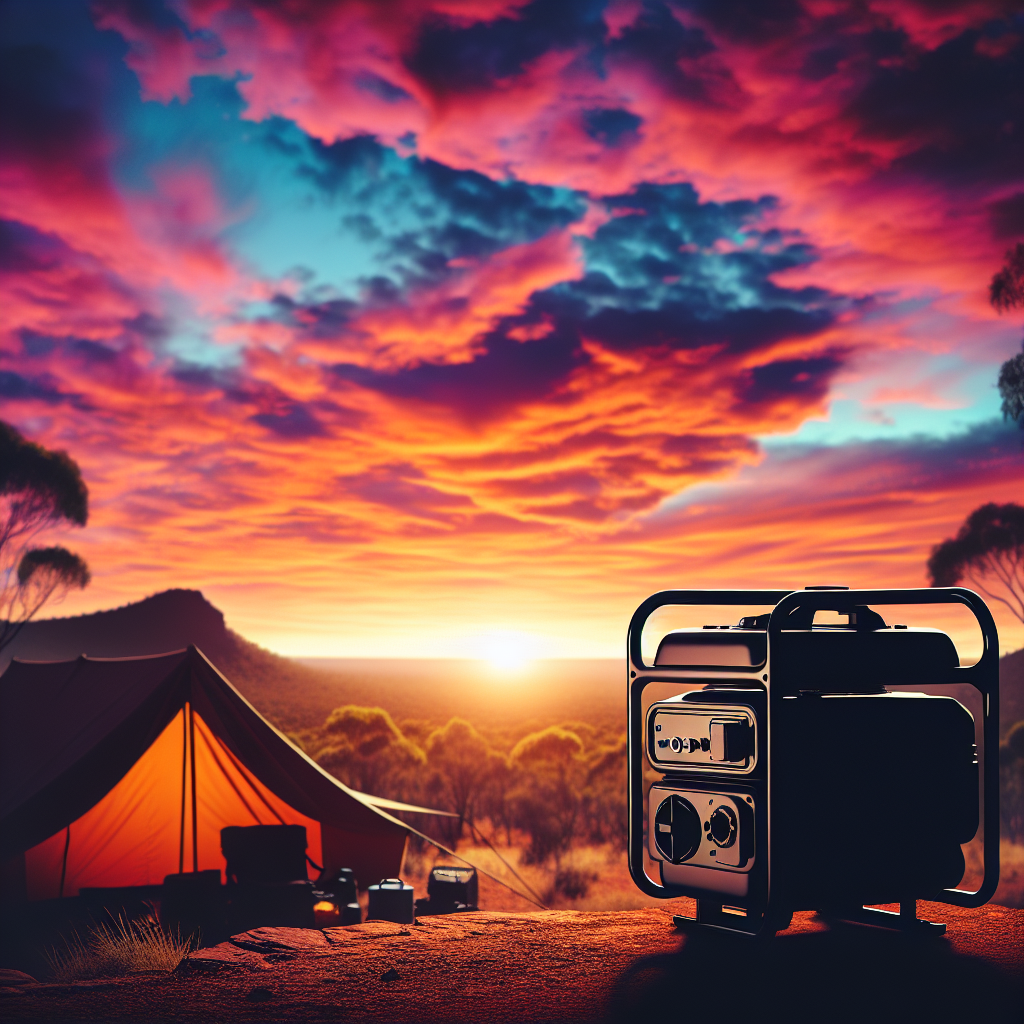

Planning a camping trip in Australia? Wondering if you can bring along a portable generator? Well, the good news is that you can! Whether you want to power up your camping appliances or charge your electronic devices, a portable generator can be a convenient companion. However, before you set off on your adventure, there are a few things you need to consider to ensure a safe and enjoyable camping experience. In this article, we will explore the guidelines and precautions to keep in mind when using a portable generator while camping in Australia. So, pack your bags, grab your generator, and get ready for a camping experience like no other!
Choosing the Right Generator for Camping in Australia
When it comes to choosing a generator for your camping trip in Australia, there are several factors to consider. One of the most important considerations is the noise level of the generator. Camping is all about enjoying the peacefulness of nature, so it’s crucial to choose a generator that operates quietly. Look for generators with noise levels below 60 decibels, as anything louder can disturb the serene ambiance of the campsite.
Another factor to evaluate is the power output of the generator. Determine the wattage requirements of your camping equipment and select a generator that can meet those needs. Make sure to consider any additional power needs, such as charging electronic devices or running lighting solutions. It’s better to choose a generator with a higher power output to ensure that you have enough energy for all your camping essentials.
Assessing the fuel type of the generator is also essential. The two main fuel options for portable generators are gasoline and propane. Gasoline generators are more common and readily available, but they require more maintenance and can be noisier compared to propane generators. On the other hand, propane generators tend to be quieter, produce fewer emissions, and have a longer shelf life for fuel. Consider your fuel preferences and availability when deciding which type of generator to choose.
Lastly, consider the weight and portability of the generator. Camping often involves moving from one location to another, so it’s important to have a generator that is lightweight and easy to transport. Look for generators specifically designed for camping, as they are typically more compact and portable. Consider the size of your camping group and the available space in your vehicle when choosing a generator with the right weight and portability.
Understanding Campsite Regulations
Before bringing a portable generator on your camping trip, it’s important to understand and comply with campsite regulations. Different campgrounds may have varying rules and restrictions regarding generator usage. Research the specific campsite you plan to visit and familiarize yourself with their rules and regulations.
Check if the campground has any specific noise restrictions in place. Some campsites have designated quiet hours, during which generators must be turned off. Make sure to adhere to these quiet hours to be considerate of other campers who may be seeking a peaceful camping experience.
Additionally, note any limitations on generator usage outlined by the campsite. Some campsites may have restrictions on the type or size of generators allowed. Make sure your chosen generator meets these guidelines to avoid any issues during your camping trip.


Potential Benefits of Using a Portable Generator
Using a portable generator during your camping trip can offer a range of benefits. One of the most significant advantages is the convenience of having a reliable power source. With a generator, you can power your camping equipment and appliances, ensuring a comfortable and enjoyable experience in the great outdoors.
A portable generator can run essential camping equipment such as refrigerators, air mattresses, and cooking appliances. This means you can keep your food fresh, sleep comfortably, and enjoy hot meals even in remote camping locations.
In addition to powering camping equipment, a generator can also charge your electronic devices. Whether you need to stay connected for emergencies or simply want to use your phone for entertainment, a generator can provide the necessary power to keep your devices charged throughout your trip.
Another benefit of using a portable generator is its ability to provide lighting solutions. Illuminate your campsite during the night with ease by using the power from your generator to light up lanterns, string lights, or even power portable floodlights for added security.
Precautions Before Using a Portable Generator
Before using a portable generator, it’s important to take certain precautions to ensure your safety and the safety of others. Familiarize yourself with the operation of the generator by reading the manufacturer’s instructions thoroughly. Understanding how to start, stop, and maintain the generator properly will prevent any accidents or damage.
Ensure that the generator is placed in a well-ventilated area. Generators emit carbon monoxide, which is an odorless and potentially deadly gas. To avoid carbon monoxide poisoning, never use a generator in an enclosed space such as tents, cabins, or vehicles. Instead, position the generator outside and away from living spaces, allowing for proper airflow.
Take fire safety measures when using a portable generator. Keep flammable materials and liquids away from the generator to prevent any accidental fires. Regularly check for any leaks or malfunctioning parts that could potentially cause a fire. It’s also a good idea to have a fire extinguisher readily available when operating a generator.
Finally, make sure to keep a safe distance from the generator when it’s running. The moving parts of the generator can be dangerous if you accidentally come into contact with them. Maintain a safe perimeter around the generator and instruct others to do the same, especially children and pets.


Environmental Considerations
As responsible campers, it’s crucial to consider the environmental impact of using a portable generator. Choose generators that have low emissions and are designed to be eco-friendly. Look for models that are certified to meet emission standards, such as those with a CSA or EPA certification.
Follow the principles of Leave No Trace when using a generator during your camping trip. Minimize noise and disruptions to wildlife by operating the generator during designated hours and reducing the load on the generator when possible. Dispose of fuel containers and any waste properly, ensuring that you leave the campsite in the same pristine condition you found it.
If you plan to camp in national parks or other protected areas, comply with their guidelines regarding generator usage. Some parks may have specific regulations or designated generator-free zones to protect the natural environment and preserve the tranquility of the area. Respect these guidelines to ensure the preservation of these beautiful landscapes for future generations.
Noise Management and Etiquette
When using a portable generator in a camping setting, it’s important to practice proper noise management and etiquette. Respect quiet hours established by the campsite and only operate your generator during permitted times. This allows fellow campers to enjoy the peacefulness and serenity of the outdoors without unnecessary noise disturbances.
To minimize the noise generated by your generator, consider using sound dampening techniques. Place the generator on an insulated pad or a rubber mat to absorb some of the vibrations and reduce the noise level. Additionally, you can enclose the generator in a soundproof generator box or construct a barrier using natural materials such as logs or bales of hay to muffle the noise.
Communication is key when it comes to generator usage in a camping setting. If possible, talk to your camping neighbors in advance and let them know about your generator use. Be open to their concerns and try to find a compromise that ensures everyone can enjoy their camping experience without disruptions. Being respectful and considerate towards others will create a harmonious camping environment.


Alternatives to Using a Portable Generator
While portable generators offer convenience and power during camping trips, there are alternative options to consider. Utilizing solar power is an environmentally friendly and sustainable option. Solar panels can be used to generate electricity and charge your camping equipment and electronic devices. This eliminates the need for fuel and minimizes noise pollution.
Opting for battery-powered equipment is another alternative to using a portable generator. Many camping essentials, such as lanterns, fans, and cooking appliances, are available in battery-powered versions. Investing in rechargeable batteries and a portable battery charger can provide a reliable power source without the noise and emissions associated with a generator.
Lastly, take advantage of campground facilities whenever possible. Many campgrounds provide amenities such as communal kitchen areas, showers, and power outlets. Utilizing these amenities reduces the need for a portable generator while still allowing you to enjoy a comfortable camping experience.
Generator Maintenance and Troubleshooting
To ensure the longevity and efficiency of your portable generator, regular maintenance is necessary. Perform routine maintenance tasks according to the manufacturer’s instructions. This may include checking and changing the oil, inspecting the air filter, and cleaning the spark plugs.
In the event of any issues or malfunctions with your generator, troubleshooting may be required. Common generator issues include starting problems, fuel leakage, or power fluctuations. Consult the troubleshooting section of your generator’s manual or contact the manufacturer’s customer support for assistance and guidance.
If you encounter persistent or more complex issues with your generator, it’s advisable to seek professional assistance. A qualified technician can diagnose and repair any underlying problems to ensure your generator operates safely and efficiently.


Tips for Proper Generator Usage
To make the most out of your portable generator and ensure its optimal performance, consider the following tips:
Use a voltage regulator to protect your camping equipment from power surges and fluctuations. This will prevent any damage to your devices and appliances, allowing them to function reliably.
Avoid overloading your generator by calculating the wattage requirements of your equipment and staying within the generator’s capacity. Overloading can damage the generator and the devices connected to it, potentially leading to electrical hazards.
Store fuel safely and in accordance with local regulations. Keep fuel containers in a cool, well-ventilated area away from living spaces and open flames. Follow proper storage guidelines to prevent accidents and ensure the longevity of your fuel.
Conclusion
Choosing the right generator for your camping trip in Australia is a decision that should be based on various factors such as noise level, power output, fuel type, and portability. By considering campsite regulations, understanding the potential benefits and precautions of using a portable generator, being environmentally conscious, practicing noise management and etiquette, exploring alternatives to generators, and properly maintaining and troubleshooting your generator, you can have a safe and enjoyable camping experience while enjoying the convenience of a portable power source. Always prioritize safety, respect for the environment, and consideration for fellow campers to make the most out of your camping adventure in Australia.


Leave a Reply